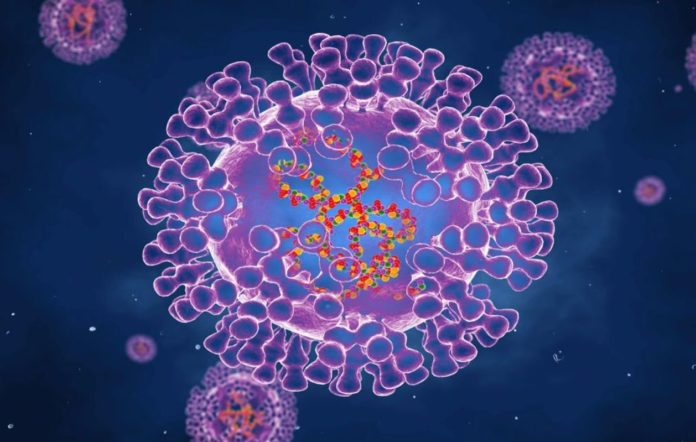Antivirals may be able to help patients with monkeypox, according to a tiny case study of seven patients who were diagnosed with the virus in the United Kingdom in recent years.
New retrospective research of seven people diagnosed with monkeypox in the United Kingdom between 2018 and 2021 reveals that some antiviral drugs may have the potential to lessen the duration of symptoms and contagiousness.
According to The Lancet Infectious Diseases journal paper, these are the first occurrences of in-hospital transmission and home transmission outside of Africa, as well as the first off-label use of two antiviral drugs to treat the disease – brincidofovir, and tecovirimat.
Brincidofovir was shown to be of little clinical benefit in the study, however, it was considered that more investigation into the potential of tecovirimat was necessary.
In addition, the scientists report finding the monkeypox virus in both the blood and the throat swabs.
Since the best ways to stop the spread of this disease and treat it are not yet known, the results of this study could help people around the world learn more about the disease’s symptoms and how it spreads.
About Monkeypox
Monkeypox has no approved therapies, and there is little information on how long it is contagious, with an incubation period varying from five to 21 days. To prevent the virus from spreading, patients are usually kept in isolation in a specialized hospital.
How Does Monkeypox Spread?
Monkeypox is transmitted from animal to human, usually through a bite or by eating undercooked meat. In rare situations, the infection can transmit from person to person. Monkeypox was first recorded in humans in 1970 in the Democratic Republic of Congo, and it is now uncommon outside of central and western Africa. There has been a minimal investigation into monkeypox instances in high-income nations to date.
What are the signs and symptoms of Monkeypox?
Fever, redness, and enlarged lymph nodes are among the symptoms of monkeypox. Inflammation of the lungs, inflammation of the brain, sight-threatening inflammation of the cornea, and subsequent bacterial infections have all been documented as complications. The fatality rates published vary widely, ranging from 1-10 percent in the Congo Basin to less than 3% in Nigeria. Monkeypox kills the majority of youngsters and HIV-positive persons.
The findings of the Monkeypox study
Four of the seven UK monkeypox cases studied in this study were imported from West Africa, with three more cases emerging as a result of human-to-human transmission within case clusters. To explain the duration and clinical aspects of monkeypox in a high-income setting, the researchers looked at clinical data as well as laboratory results from blood tests and nose-and-throat swabs. Antiviral drugs used to treat smallpox – brincidofovir and tecovirimat – have already shown some efficacy against monkeypox in animals, according to the researchers.
Four of the patients in this study were treated for monkeypox in HCID centers in England between 2018 and 2019. These three patients were brought in from West Africa. The fourth incidence occurred 18 days after initial exposure to the virus and was the first instance of monkeypox transmission outside of Africa in a hospital setting.
The first three patients were given brincidofovir seven days after the rash first appeared. Brincidofovir was shown to have no convincing therapeutic advantage in the treatment of monkeypox, and it produced changes in liver blood tests. The researchers point out that it’s unclear whether giving brincidofovir earlier in the disease or on a different dosing schedule would have resulted in different clinical results. Despite this, all three patients recovered completely, as did the fourth hospital transmission patient.
In 2021, a family traveling from Nigeria reported three more cases of monkeypox in the UK, with two of these cases being the first examples of household transmission outside of Africa. One of these cases was a youngster who was closely monitored due to the fact that monkeypox is associated with a higher risk of mortality in children. Fortunately, this person just had a little ailment and recovered completely.
One of the 2021 UK patients who received tecovirimat had a shorter duration of symptoms and less viral shedding in the upper respiratory tract than the other instances in this cluster. However, because inferences about antiviral effectiveness against monkeypox can’t be reached from such a small cohort, the authors recommend more studies into antivirals to treat this neglected tropical illness.
All of the patients had a mild infection and were treated in a hospital environment for infection control rather than infection severity. Although no patients had the frequent severe sequelae of monkeypox, such as pneumonia or sepsis, one patient had a slight relapse six weeks after being discharged from the hospital, and another developed a deep tissue abscess that required drainage. Patients were also observed to be depressed, which was most likely due to their seclusion in HCID facilities.
“During previous outbreaks of monkeypox, patients were considered infectious until all lesions crusted over. In these seven UK cases, viral shedding was observed for at least three weeks following infection. However, data on infectivity remains limited, and is an important area for future study,” adds Dr. Catherine Houlihan of the UK Health Security Agency and University College London, one of the paper’s co-authors.
The authors admit that this study has certain limitations, including its observational character and the small number of cases examined. Additionally, the researchers were unable to validate positive monkeypox PCR test results with laboratory samples of the virus, implying that continuous infectious viral shedding could not be confirmed.
Image Credit: Getty
You were reading: Scientists Think We Already Have Antivirals for Monkeypox
